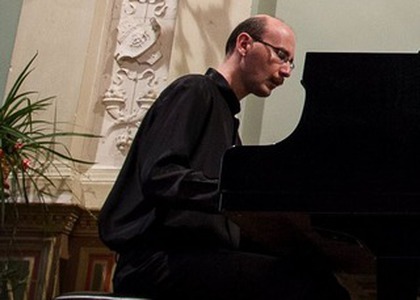> [Archived] Interviews

Interview with organist Zoltán Horváth, initiator of the Bach Marathon
Today, March 21st, 2022, the first "Bach Marathon" takes place in Cluj-Napoca; a series of concerts ongoing during 12 hours. The event is meant to mark the birthday of the composer Johann Sebastian Bach, born on March 21st, 1685.
More details about this project we find out from Zoltán Horváth, the organist of the Pietati church and the initiator of the "Bach Marathon":
You are organizing, at the Lutheran Church Pietati in Cluj-Napoca, the first Bach marathon, an event meant to celebrate the composer Johann Sebastian Bach on the very day he was born. A series of concerts that started this morning at 9am and will continue until late in the evening, about 12 hours of music in total. How has the idea of this project been born?
On the one hand, we know that the great Johann Sebastian Bach's artistic work is part of the musical heritage of all humankind, but much of this work has been inherited through the Lutheran Evangelical Church. Many of the composer's compositions are closely related to the Liturgy. That's why we felt somehow responsible for promoting Bach's music and for keeping this tradition alive.
On the other hand, the building of our church in the centre of Cluj has been recently renovated with European funds, including the organ made by the Walker company, a genuine jewel. And, through this initiative, we are trying to get back into the city's musical cultural circuit.
How did you decide upon the choice of the musical programmes for today's concert? I noticed that among them there is a series of educational concerts.
We have two educational concerts - one in Hungarian starting at 11am and one in Romanian, starting at 12pm - according to the dramaturgy of Mrs Ștefana Țițeica. On this occasion I would like to thank her for all the contribution and support offered to this event which will be addressed to children in the third and fourth grades. Today we expect over a hundred children at each event.
A rather varied repertoire has been constructed, mostly instrumental. For example, we will be able to hear the composer's compositions for keyboard instruments being performed on piano, harpsichord and organ. In our country, the simultaneous presence of the three instruments in a single event is quite unique. But, of course, we will also listen to solo violin partitas and sonatas, cello suites, chamber music, vocal music.
The marathon will end with the concert of the baroque band of "Transylvania" Philharmonic from Cluj.
You have invited more than 50 artists, who are mentioned in the press release as participating voluntarily, and you have involved a number of musical institutions in Cluj-Napoca. Please tell us about the participants. How did you think up their list?
The marathon has as its partners three important musical educational institutions in Cluj - "Gheorghe Dima" National Music Academy (students and professors will participate), the High-school of music "Sigismund Toduțã" and the Faculty of Reformed Theology and Music of the "Babeș-Bolyai" University. It is the first marathon and we invited the artists who, before the renovation of the church, performed in concerts organized here and thus the programme has been constructed. But we also have guests: the Duo Aperto, made up of Dolores Chelariu and Ladislau Csendescoming from Bucharest, as well as an organist from Vienna, Windhager-Geréd Erzsébet, who is the organist of the Evangelical Lutheran Church in the centre of Vienna.
Do you want this Bach Marathon to become a tradition at the Pietati Church?
We hope so. That's how we started this project, in the long run, and we'll see how the public reacts and how the event will take place today.
Translated by Ecaterina Bucovanu,
University of Bucharest, Faculty of Foreign Languages and Literatures, MTTLC, year I
Corrected by Silvia Petrescu














